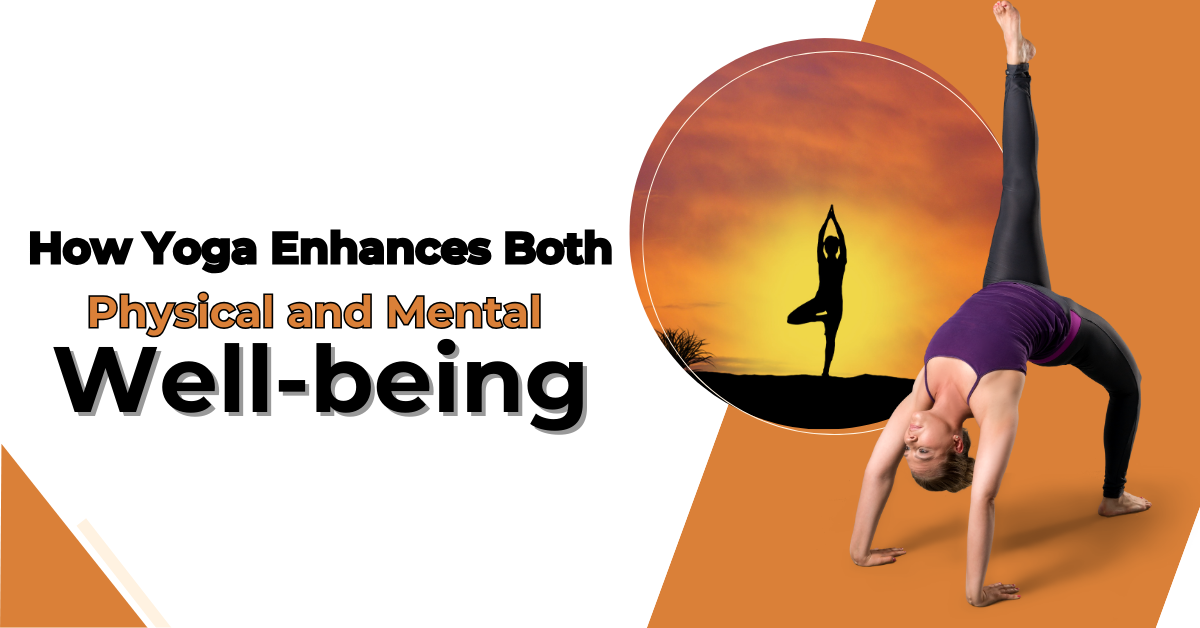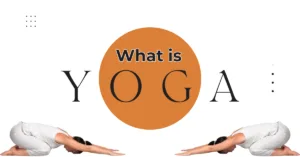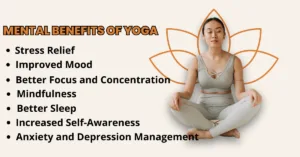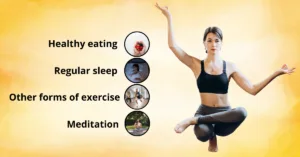
How Yoga Enhances Both Physical and Mental Well-being
- 19
- 0
- 0
Yoga enhances both physical and mental well-being by promoting flexibility, strength, and balance through its various poses. It improves respiratory function and circulation, reducing stress and anxiety. The practice encourages mindfulness and self-awareness, fostering emotional stability and mental clarity. Regular yoga sessions can alleviate symptoms of depression and enhance overall mood. Additionally, it cultivates a sense of community and connection, contributing to social well-being. Ultimately, yoga nurtures a holistic approach to health, benefiting both body and mind.
How Yoga Enhances Both Physical and Mental Well-being
Yoga is an ancient practice that has gained worldwide popularity in recent years. It’s not just about twisting your body into pretzel-like shapes or sitting still for hours. Yoga is a complete system that can improve your overall health, both physically and mentally. In this blog, we’ll talk about how yoga enhances both physical and mental well-being.
What is Yoga?
Yoga is an old practice that started in India thousands of years ago. It includes physical poses, breathing exercises, and meditation. The word “yoga” comes from Sanskrit and means “to join” or “to unite.” This refers to the connection between the body and mind that yoga tries to create.
Physical Benefits of Yoga
Improved Flexibility
One of the most noticeable advantages of yoga is improved flexibility. Initially, you may struggle to reach your toes, but with practice, you’ll notice significant progress. But over time, you’ll notice that you can reach further and bend more easily. This isn’t just about being able to do cool poses – better flexibility can help prevent injuries and reduce body aches.
Stronger Muscles
While yoga isn’t the same as lifting weights, many yoga poses can help build strength. Poses like plank, chair pose, and warrior pose use your body weight to make your muscles stronger. This kind of strength-building is gentle on your joints and can help improve your posture.
Better Balance
Many yoga poses focus on balance, like the tree pose or dancer’s pose. Practicing these regularly can improve your overall balance and stability. This is especially helpful as we get older, as good balance can prevent falls and injuries.
Improved Posture
Yoga helps make you more aware of your body and how you hold it. Many poses strengthen the core muscles that support your spine. With regular practice, you may find yourself standing taller and sitting straighter without even thinking about it.
Better Breathing
Yoga teaches you to pay attention to your breath and to breathe more deeply. This can increase your lung capacity and make your breathing more efficient. Better breathing can lead to improved energy levels and can even help with conditions like asthma.
Heart Health
While yoga isn’t usually a high-intensity workout, it can still be good for your heart. Some studies have shown that yoga can lower blood pressure and slow the heart rate. This can be especially helpful for people at risk of heart disease.
Pain Relief
For people with chronic pain conditions like arthritis or back pain, yoga can be a gentle way to move the body and find relief. The combination of stretching, strength-building, and relaxation can help ease pain and improve quality of life.
Mental Benefits of Yoga
Stress Relief
One of the biggest mental benefits of yoga is stress relief. The combination of physical movement and focused breathing can help calm your mind and relax your body. Many people find that a yoga session leaves them feeling more peaceful and less worried.
Improved Mood
Regular yoga practice has been linked to increased production of serotonin, a chemical in the brain that helps regulate mood. Many people report feeling happier and more content after starting a yoga practice.
Better Focus and Concentration
Yoga teaches you to focus on the present moment – how your body feels, how you’re breathing, or a specific point of concentration. This practice can carry over into daily life, helping you to concentrate better at work or school.
Mindfulness
Mindfulness means paying attention to the present moment without judgment. This is a key part of yoga practice. By learning to be more mindful on your yoga mat, you can become more mindful in your daily life. This can lead to greater enjoyment of life’s simple pleasures and better handling of life’s challenges.
Better Sleep
Many people struggle with sleep issues, but yoga might help. The relaxation techniques you learn in yoga can help you quiet your mind when it’s time for bed. Also, physical practice can help tire out your body in a healthy way, making it easier to fall asleep.
Increased Self-Awareness
As you practice yoga, you become more in tune with your body and your thoughts. This increased self-awareness can help you recognize and change negative patterns in your life, leading to better overall mental health.
Anxiety and Depression Management
While yoga shouldn’t replace professional mental health care, many people find it helpful in managing symptoms of anxiety and depression. The combination of physical activity, breathing exercises, and meditation can provide a natural mood boost.
How to Start a Yoga Practice
If you’re interested in trying yoga, here are some tips to get started:
- Start slow: Begin with beginner classes or videos. Don’t overexert yourself in the beginning.
- Find a style that suits you: There are many types of yoga, from gentle and relaxing to more physically challenging. Experiment with various styles to discover which one suits you best.
- Use props: Yoga props like blocks, straps, and blankets can help you get into poses safely and comfortably.
- Focus on your breath: Even if you can’t do all the poses perfectly, focusing on your breathing will help you get benefits from your practice.
- Be consistent: Try to practice regularly, even if it’s just for a short time each day.
- Don’t compare yourself to others: Everyone’s body is different. Focus on your practice and progress.
- Listen to your body: If something hurts, stop. Yoga should be challenging but not painful.
Combining Yoga with Other Health Practices
While yoga can provide many benefits on its own, it works even better when combined with other healthy habits:
- Healthy eating: A balanced diet can help you get more out of your yoga practice and feel better overall.
- Regular sleep: Good sleep habits can improve your energy for yoga and help you get more mental benefits from your practice.
- Other forms of exercise: Yoga pairs well with other types of physical activity like walking, swimming, or strength training.
- Meditation: While yoga often includes some meditation, adding extra meditation practice can boost the mental health benefits.
Conclusion
Yoga is an effective practice for enhancing both physical and mental well-being. From making your body stronger and more flexible to help you feel calmer and more focused, the benefits of yoga are wide-ranging. Whether you’re looking to improve your physical fitness, manage stress, or simply feel better in your daily life, yoga has something to offer.
Remember, you don’t have to be super flexible or in perfect shape to start yoga. It’s a practice that meets you where you are and helps you grow from there. So why not roll out a mat and give it a try? Your body and mind might just thank you for it.
FAQs
Q: How does yoga improve flexibility?
A: Yoga involves stretching and holding various poses. This gently lengthens your muscles and increases your range of motion over time. Regular practice helps you become more flexible, reducing stiffness and making everyday movements easier.
Q: Can yoga help with stress relief?
A: Yes, yoga is great for stress relief. It combines deep breathing, physical movement, and mindfulness. This combination helps calm your mind, relax your body, and lower stress hormones like cortisol, leaving you feeling more peaceful.
Q: Does yoga help with weight loss?
A: While not as intense as some workouts, yoga can support weight loss. It burns calories, builds muscle, and increases body awareness. This can lead to better food choices and a more active lifestyle overall.
Q: How does yoga improve mental health?
A: Yoga promotes mindfulness and self-awareness. It can boost mood-regulating brain chemicals and reduce anxiety and depression symptoms. The focus on breathing and present-moment awareness can improve overall mental well-being and emotional balance.
Q: Is yoga good for heart health?
A: Yes, yoga can benefit heart health. It can lower blood pressure, reduce stress, and improve circulation. Some yoga styles also provide cardiovascular exercise. These effects together can help maintain a healthy heart and reduce heart disease risk.
Also Read:
Modern Dance as a Fun Way to Stay Fit
Beginner’s Guide to Starting a Fitness Journey
References:
https://www.ncbi.nlm.nih.gov/pmc/articles/PMC3447533/
Related post

Top Benefits of Kickboxing for Fitness and Self-Defense






